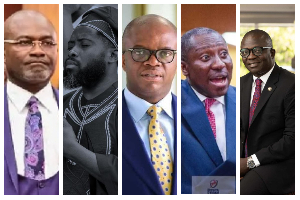A preacher once remarked that the largest aggregation of talent – more precisely, wasted and irretrievable talent – is found in a cemetery. Each time one goes to a cemetery – whether to bury someone who has recently died, or visit the tombstone of a loved one who was taken away in the prime of his life – one ought to mull over the fact that a cemetery is not only a place of interment, it is also a place that holds decayed, and decaying, brains that were probably never put to maximum use. This writer generally does not believe in bowdlerization, or censorship – but political, religious and personal freedoms, it must be observed, are not a license to indulge in dangerous and shameful activity. While the resilient and peace-loving spirit of the Ghanaian makes it easy for him to co-exist with his fellow nationals, Ghanaweb.com has inadvertently become a platform for frustrated and angry Ghanaians to ridicule one another – even to despicable proportions.
Francis Akoto may not have intended his leading pro-Ghanaian Web site – Ghanaweb.com – to be used for shameful propaganda, but it has, sadly, become a conduit for ideologues and demagogues bent on ridiculing and dehumanizing others who hold opposing views. This dangerous trend is not sustainable, because, ultimately, the verbal assaults could lead to a greater calamity in the foreseeable future, which I prefer to not amplify. For now, it is no more than varying assaults on egos, but who knows when someone will eventually snap and take it outside the confines of the Internet? We ought to understand that a minor misunderstanding could, ultimately, trigger a larger and unmanageable inferno. History is replete with the dastardly acts of man against his fellow man, as a result of differing ideologies, so we all ought to be careful about the things we write about on pro-Ghanaian Internet conduits, especially the oft-accessed Ghanaweb.com.
It is a disaster for us to assume that masculinity is synonymous with the capacity to heap abuse on others. In fact, a real man, because he learns early in life to seek truth and reconciliation when things go awry, is circumspect in his utterances and writings. And just as a real man never hits a woman under any circumstances, a real man seeks peace with his neighbor when a misunderstanding arises. Ghanaweb.com has become an accidental medium for some for the castigation of those who hold opposing views, and the accretion of these insults will soon reach a boiling point, blowing off the roof of peace that currently sits over our collective heads as Ghanaians.
The human mind is inherently imbued with power to change the world for the better, but many people never realize their full potential in life due to an avalanche of reasons, one being the strangulating burden of intense hostility, perhaps because they disagree with others. If all men reasoned alike, the world would be a dull place – which is why the Christian must not impose his beliefs on the Muslim, the Muslim on the Buddhist, the Buddhist on the agnostic, et cetera. In other words, we live in a world where a divergence of opinions is as prevalent as the dissimilar landscapes on which we find ourselves – and the assumption that our position is the only right one is the quickest path to stoking the embers of conflict.
As a Christian, I believe in the tenets of my faith – from Christ’s propitiatory sacrifice on a cross for my sins to justification by faith to divine healing, among other things – but it will be foolhardy to impose my faith on others. If I threaten non-Christians with injury or death because they do not subscribe to my beliefs, then I am, indeed, a fanatic whose irrationality ought to be condemned. Extrapolate the preceding scenario to the vile activities on Ghanaweb.com and we have before us a classic example of hate and bigotry.
The asinine and brutish remarks that have become the hallmark of some people on Ghanaweb.com cannot continue unchecked. Many levelheaded and intelligent people have left this all-embracing Web site because they refuse to afflict their consciences with the insensitive remarks of some angry and ill-mannered people: the more they read such tactless comments, the more they move away from pro-Ghanaian Web sites altogether. In fact, if we allow the abusers and indecorous people to take over Ghanaweb.com, in particular, then we would have given away, on a silver platter, an important portal that brings together Ghanaians, from all walks of life and from all parts of the globe, who are interested in discussing the issues that both advance the lot of the hoi polloi and crystallize our enviable democratic credentials.
Calling fellow Ghanaians “cat thieves,” “foreigners,” “bush-rat eaters,” “Trokosi practitioners,” “slaves,” “morons,” “dog-chain sellers,” “shoeshine boys,” “baboons,” et cetera, is not indicative of a good upbringing. In fact, the problem is now systemic – it will require a concerted and collective effort to end the abuse. What we need to do is examine our hearts individually and call ourselves to order, without a nudge from others.
Ghanaweb.com can become a place where we oppose one another vehemently on ideological grounds, without any accompanying insults; a conduit for assessing our national goals, even if we find ourselves on opposite sides of the political divide; and a medium for attacking the myopic and controversial policies of government, without mockingly referring to, say, the sitting president as “blind,” “Atta do-nothing,” “foolish” or “a dying man.” Ghanaian culture, in its totality, discourages pleasure at others’ misfortunes, so it comes as a shock when we stumble upon comments that appear to take pride in others’ personal problems. Very un-Ghanaian, indeed. And it is for the same reason that we often refrain from making snide comments about the dead.
Let us cultivate ideas that will transform our nation, so we do not end up in the grave someday, having accomplished nothing to make life better for posterity. Let us learn to project a positive image of Ghana, instead of the never-ending abuse that easily captures the imagination on Ghanaweb.com these days. The tombstones of those who have gone before us may hold an important lesson for us: we have a short time on God’s Earth to make an impact in the lives of others. Would it not be better to use our time and talent to promote the good of many? Should we be remembered fifty, sixty or seventy years from now as fomenters of trouble and disunity? We have the opportunity to make a positive difference in the lives of others by what we say, write and do. Perhaps, we could make the all-important decision to change our ways in the coming year.
Daniel K. Pryce
E-mail: dpryce@cox.net
Opinions of Wednesday, 29 December 2010
Columnist: Pryce, Daniel K.














